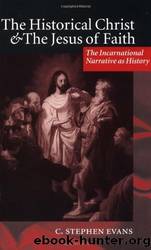The Historical Christ and the Jesus of Faith: The Incarnational Narrative as History by C. Stephen Evans

Author:C. Stephen Evans [Evans, C. Stephen]
Language: eng
Format: epub
Tags: Religion, Christian Church, Unknown, History
ISBN: 9780198263975
Publisher: Oxford University Press
Published: 1996-04-18T04:00:00+00:00
8.6. THE SOCIOLOGY OF KNOWLEDGE AND APPEALS TO AUTHORITY
In the end I suspect that Harvey and others who share his view will be unmoved by arguments such as I have put forward. For Harvey, defences of miracles are difficult to take seriously; such thinking violates âwhat we now call the common-sense view of the worldâ.57 Such claims go hand in hand with sweeping claims about what it is possible for the âmodern mindâ to believe.58 Defences of miracles are defences of a lost cause, roughly akin to putting forward arguments in favour of a flat earth. Those such as myself who put forward such arguments are viewed with wonderment; we are living fossils, âpre-criticalâ thinkers who have somehow survived into the late twentieth century, oblivious to the securely established conclusions of Hume and Kant.
There is a deep irony here, for the mind-set of the âcriticalâ thinker I have just described is anything but critical. In fact, what we have here is an unacknowledged, and perhaps unconscious, appeal to authority, the anonymous authority of the âmodern mindâ. Such an appeal is doubly ironical, for one of the accusations Harvey and his type bring against defenders of the reliability of the biblical narrative is that such defenders uncritically accept the authority of the Bible. Nevertheless, those who find biblical miracles plausible are somehow unreasonable because they do not accede to the supposed common sense that âweâ all are supposed to share.
Though I am not a fan of everything in post-modern writers, one thing that post-modernism has usefully taught us to do when someone talks about âweâ is to ask âWho is this âweâ?â Does this âweâ include the poor? Does it include women? Does it include non-Westerners and minorities of colour within the West? Since traditional religious beliefs, including belief in the supernatural, are more common among the poor, among women, minorities, and in the Christian Church in Asia, Africa, and Latin America (though not always more common among the self-appointed advocates of those groups), these questions are quite relevant. Nor of course, for that matter, is there any shortage of white, Western, educated males who believe in the supernatural, if one simply looks around at the actual world. It seems to me that theologians who are truly âcriticalâ will begin to ask critical questions about their own inherited intellectual baggage, and will be much less quick to assume that the taken-for-granted assumptions of many secular Western intellectuals over the past two hundred years form a necessary part of âcommon senseâ. Though there is much that is bizarre that is being put forward under the banner of âpost-modernismâ, surely one thing that this intellectual movement should cause us to do is to re-examine the âmodernâ intellectual assumptions about the supernatural that we have inherited from the Enlightenment.
Deciding whether belief in miracles is reasonable on the basis of what âmost intellectualsâ in the West over the past two hundred years have thought is only a bit more reasonable than deciding who to vote for on the basis of who is leading in the opinion polls.
Download
This site does not store any files on its server. We only index and link to content provided by other sites. Please contact the content providers to delete copyright contents if any and email us, we'll remove relevant links or contents immediately.
The Lost Art of Listening by Michael P. Nichols(7494)
Why I Am Not A Calvinist by Dr. Peter S. Ruckman(4149)
The Rosicrucians by Christopher McIntosh(3511)
Wicca: a guide for the solitary practitioner by Scott Cunningham(3167)
Signature in the Cell: DNA and the Evidence for Intelligent Design by Stephen C. Meyer(3130)
Real Sex by Lauren F. Winner(3014)
The Holy Spirit by Billy Graham(2944)
To Light a Sacred Flame by Silver RavenWolf(2814)
The End of Faith by Sam Harris(2733)
The Gnostic Gospels by Pagels Elaine(2527)
Waking Up by Sam Harris(2454)
Nine Parts of Desire by Geraldine Brooks(2361)
Jesus by Paul Johnson(2352)
Devil, The by Almond Philip C(2325)
The God delusion by Richard Dawkins(2305)
Heavens on Earth by Michael Shermer(2278)
Kundalini by Gopi Krishna(2180)
Chosen by God by R. C. Sproul(2161)
The Nature of Consciousness by Rupert Spira(2104)
